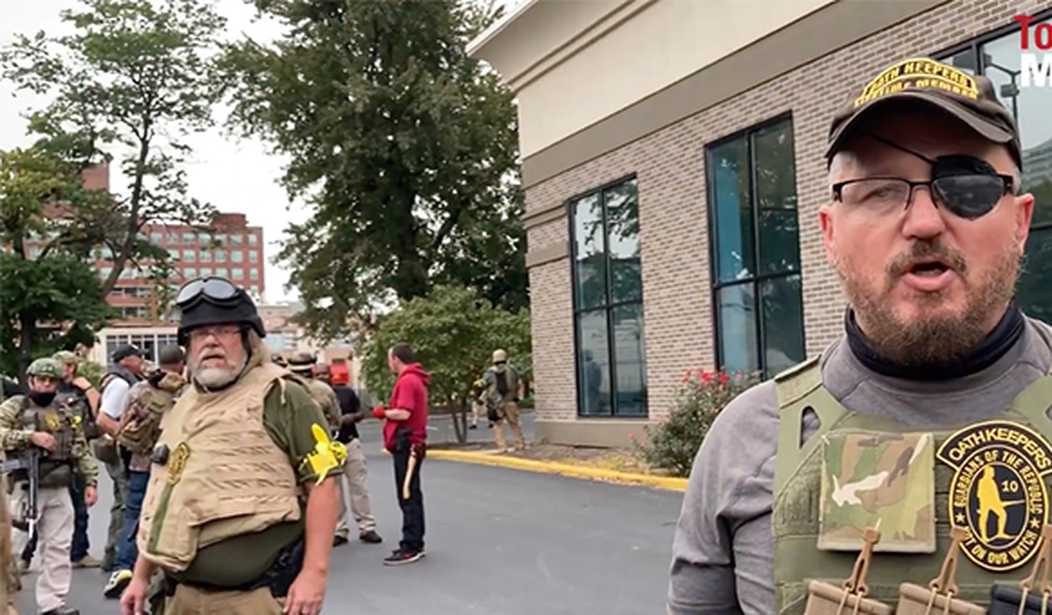Unfortunate timing for Brit Hume, who posted this just a few hours before the indictments were announced:
Here's a thought. Let's base our view on whether 1/6 was an "insurrection" on whether those arrested are charged with insurrection. So far, none has been. https://t.co/szsAGU3bz0
— Brit Hume (@brithume) January 13, 2022
That’s a common sentiment among January 6 apologists. If it was an “insurrection” against the incoming government, why do so many of the charges involve penny-ante crimes like trespassing? A true insurrection would presumably warrant sedition charges, no?
The sedition charges are here. Eleven members of the Oath Keepers, including founder Stewart Rhodes, have been indicted for seditious conspiracy:
DOJ says it's charged almost a dozen people, including the leader of the Oath Keepers, with seditious conspiracy re: the January 6 attack on Congress pic.twitter.com/vKTElvdfjb
— Matt Ford (@fordm) January 13, 2022
18 U.S. Code § 2384:
If two or more persons in any State or Territory, or in any place subject to the jurisdiction of the United States, conspire to overthrow, put down, or to destroy by force the Government of the United States, or to levy war against them, or to oppose by force the authority thereof, or by force to prevent, hinder, or delay the execution of any law of the United States, or by force to seize, take, or possess any property of the United States contrary to the authority thereof, they shall each be fined under this title or imprisoned not more than twenty years, or both.
It seems like there were two groups at the Capitol on January 6. One consisted of people like the QAnon Shaman, clowns who got swept up in the moment and joined the assault on Congress once it got going with little idea of what they’d do once they got inside. There was no “plan” per se beyond disrupting the proceedings and maybe putting their feet up on Nancy Pelosi’s desk to take a selfie for Instagram. The feds might be able to prove seditious intent among members of that clown cohort (specifically, intent to “prevent, hinder, or delay the execution of any law”) but the politics of charging American citizens with sedition are electrically charged. If you plan to indict someone for a crime as politically fraught as that, you want to aim it at those whose seditious intentions weren’t in doubt. That’s difficult with an oaf like the QAnon Shaman.
The second group, which included militia types like the Oath Keepers, allegedly meant business. They did have a plan, if you believe the feds:
Mr. Rhodes, a former Army paratrooper who went on to earn a law degree at Yale, has been under investigation for his role in Jan. 6 since at least last spring when, against the advice of his lawyer, he sat down with F.B.I. agents for an interview in Texas. He was at the Capitol on Jan. 6, communicating by cellphone and a chat app with members of his team, many of whom went into the building. But there is no evidence that he entered the Capitol.
The Oath Keepers, along with the Proud Boys, have emerged as the most prominent far-right extremists to have taken part in the assault on the Capitol. Prosecutors have collected reams of evidence against them, including encrypted cellphone chats and recordings of online meetings. They have charged its members not only with forcing their way into the building in a military-style “stack,” but also with stationing an armed “quick reaction force” at a hotel in Virginia to be ready to rush into Washington if needed…
[A]t least four Oath Keepers who were at the Capitol that day and are cooperating with the government have sworn in court papers that the group intended to breach the building with the goal of obstructing the final certification of the Electoral College vote.
Rhodes didn’t enter the Capitol on January 6, it appears, but he was communicating with members of his group as they stormed the building. He told the media later that those people “went totally off mission” and that he was only in contact with them to “keep them out of trouble.” If so, that represented a remarkable change of heart:


That same month, per the NYT, he called on Trump to invoke the Insurrection Act or else a “much more bloody war” would result. A month previously, he claimed that he had men stationed around D.C. to act upon Trump’s command if need be. A group founded to defend the Constitution via force of arms by a guy who used to work for Ron Paul was prepared to act as a self-appointed paramilitary force to help install an inchoate right-wing autocracy. I wish I were surprised.
Here’s the key difference between Rhodes and the QAnon Shaman, I assume:

The Oath Keepers didn’t breach the building because they wanted to take photos for Instagram.
You should read the indictment, as it tracks the communications among Rhodes’s group minute by minute on January 6. They were reportedly thrilled with their success that evening, vowing more to come — which contradicts Rhodes’s self-serving claim later that his men had gone “off-mission” that day:

Rhodes went on to buy “a large volume of firearms and other equipment” in the weeks following. Why he didn’t use them is unclear; maybe the feds let it be known to him that he was being watched. Either way, it seems that these idiots gambled that their encrypted Signal communications would stay encrypted, allowing them to express their true intentions to each other without fear of those messages eventually being used as evidence against them. Oops.
Silver lining for Rhodes, though: Even if he’s convicted, he’ll probably be pardoned in 2025.
Until then, with zero defendants yet to be charged with the actual crime of insurrection, we should probably stop using that word to describe what happened at the Capitol. How about “the seditious conspiracy of January 6” instead?








Join the conversation as a VIP Member